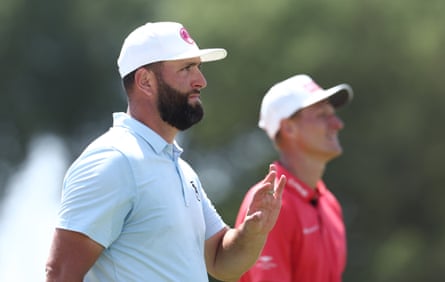The second series of Full Swing has its moments. The trouble is, anybody seeking deep insight into the civil war/kiss and make up/civil-war status of elite golf will be left frustrated by the latest release of the Netflix documentary. While it is easy to blame producers for this, it must be remembered the golf world is horrendously muddled. It is not that people choose not to speak with certainty, they just find themselves unable to.
Onlookers are left without proper detail of precisely how and why the PGA Tour signed a framework agreement with Saudi Arabia’s Public Investment Fund. Paulina Gretzky, the wife of Dustin Johnson, gushes about how much more time their family has together after the former Masters champion’s leap to LIV but other key players who were castigated for the same switch – Ian Poulter, Henrik Stenson, Phil Mickelson – do not appear on camera to give their sentiment as a dramatic 2023 unfolded. This felt a missed opportunity. Jon Rahm, who joined LIV late in the year, is a notable absentee. So, too, is Tiger Woods. The failure to feature the world’s best female golfers in a Solheim Cup year will inevitably raise eyebrows.
Zach Johnson, the US Ryder Cup captain, somehow manages to make a memorable spat between Rory McIlroy and the caddie Joe LaCava sound boring. “What happened, happened,” he opines. Earlier footage shows Shane Lowry calling LaCava a “fucking prick” as tensions rose in Rome. Johnson appears a quivering wreck as he returned to the team hotel following a bruising opening day.
There are lighter moments. The best among them involves Justin Thomas raising a toast to Mito Pereira at the US PGA’s champions dinner. “This would not be happening without him,” he says. Pereira led by a shot when taking to the final hole of the 2022 tournament before capitulating. Thomas won in a playoff.
McIlroy, as with so much involving the PGA Tour, saves the day by offering time and access. His candour over the PIF deal is one thing but more striking is the scale of dejection after major championships. The Northern Irishman admits he played like “dog shit” while missing the cut at the Masters. At the US PGA, he cuts a forlorn figure after again falling short. A “lost” McIlroy says he felt at that moment his game needed a “complete reboot”.
He is similarly despondent in Los Angeles after Wyndham Clark pinched the US Open. “We’re going to get one of these things fucking sooner or later,” says McIlroy, slamming a water bottle to the ground, of a wait for a fifth major that stretches back to 2014. This all serves as a reminder that McIlroy cares deeply about his professional pursuits.
McIlroy remains absolutely essential not only to a documentary series but to the PGA Tour as a crowd puller. By the time the Cognizant Classic was rumbling towards conclusion on Monday – the consequence of yet another weather delay – nobody outside of dedicated golf followers particularly cared. Television viewing figures will emphasise that much. The Phoenix Open was marred by unruly crowd behaviour. Woods’s eagerly anticipated appearance at the Genesis Invitational was cut short by illness; there is still no guarantee the 15-time major winner will return at next week’s Players Championship.
There, as at this week’s $20m (£15.7m) Arnold Palmer Invitational, Rahm, Dustin Johnson and Brooks Koepka are absentees. The Arnold Palmer is a signature event, a tournament with a limited field brought about in part to retain players as LIV hovers. Tony Finau’s withdrawal from Bay Hill leaves 69 in the draw and the preposterous scenario of Nick Dunlap playing alone at the head of Thursday’s proceedings.
Golf appears no closer to finding a route towards all its best players competing regularly on the same stage; which undermines the product for sponsors and paying customers. Rahm, Tyrrell Hatton and Adrian Meronk were the latest golfers to accept LIV’s lucrative advances but there is no chance they will be the last. As Saudi Arabia continues to fund the rebel tour, players will continue to be hauled away from the PGA Tour. That talent drain, at whatever pace, has caused serious problems.
after newsletter promotion
It is not all bad news. An ownership conglomerate including Fenway Sports saw enough in the PGA Tour to invest $1.5bn in a new commercial entity. Golf’s participation boom during Covid times means there is a captive audience for anybody able to grasp it.
The human side of this business that has lost the plot in financial terms can be seen in Full Swing. There is the story of golfing brothers, Alex and Matt Fitzpatrick. Joel Dahmen’s struggles and Rickie Fowler’s return to the big time after years in the wilderness will resonate. Keegan Bradley is devastated at not receiving a Ryder Cup wildcard call, as is Zach Johnson’s young son after Europe’s triumph. It’s not all about Dustin Johnson on his boat or Koepka admitting the deal that took him to LIV was worth nine figures.
Next week at Sawgrass, the PGA Tour’s commissioner, Jay Monahan, is expected to give his annual state of the nation address. He has been in battle mode, and with varying degrees of success or failure, since LIV morphed from concept to reality. This time there needs to be a frank admission that this fractured game serves little purpose. If the PGA Tour wants to brand itself as the summit of this sport, it needs the best players on cast lists. The uncertainty running through Full Swing inadvertently sums up golf.






Be First to Comment